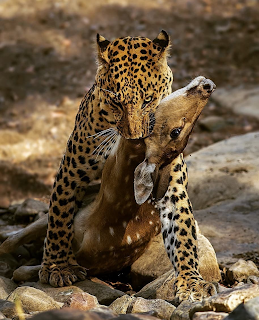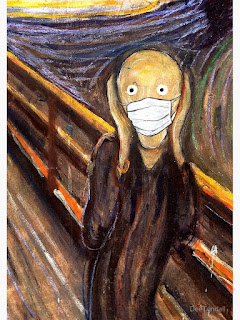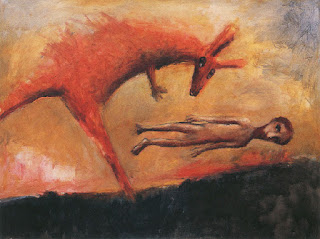I.
I closed part one of this post with a question that Byung-Chul Han puts to his readers: "When the 'here and now' becomes a repeatable there and later, will we have gained something or lost something?" [a]
To put this slightly differently: should we celebrate becoming hypercultural tourists, or should we discard our Hawaiian shirts and seek out an alternative way of being in the world? Might we, for example, endeavour to become pilgrims - walking the earth and giving form to the formless, making the fragmentary whole, as Zygmunt Bauman [b] would have it?
Well we might: but probably this would be futile. For hyperculturality is an evironment that produces (and allows for) a particular type of tourist - not pilgrims. Bauman, says Han, remains a romantic thinker who fails to recognise what is so unique about the hypercultural tourist; one who "knows neither longing nor fear" [41].
Unlike pilgrims, for example, hypercultural tourists always remains in the here and now; they are not "on their way to a counter-world, to a There" [40].
Having said that, I still wonder if there is an alternative to tourism ... Or must we all learn to laugh like Odradek [c] and accept ourselves as patchwork individuals with multicoloured natures?
II.
It's obviously important to get terms straight: to understand that hyperculturality is a contemporary phenomenon that is uniquely different to interculturality, multiculturality, and transculturality ...
According to Byung-Chul Han, the first two of these things are historically "connected with nationalism and colonialism" [53] and, philosophically, they "presuppose the introduction of an essentialist notion of culture" [53].
As for transculturality, which is all about transgression and the crossing of borders, that also has nothing to do with hyperculturality, wherein different cultural forms are simply placed side by side in a "borderless hyperspace" [56] and one is afforded the opportunity (as a tourist) to browse.
Hyperculture also differs from multiculture "insofar as it involves little remembrance of origin, descent, ethnicity or site" [56-7].
In sum:
"Contemporary culture is marked not by the trans, the multi or the inter but by the hyper. The cultures between which an inter or a trans would take place are un-bounded, de-sited, and de-distanced: they have been turned into hyper-culture." [56]
Hyperculturality also "presupposes certain historical, sociocultural, technical and media processes" [57] and is linked to "a novel experience of space and time, a type of identity formation and a form of perception" [57].
III.
One of the things I like about hyperculture is that it doesn't regard appropriation as something sinful.
Indeed, hyperculture desires and requires an intense level of appropriation in order to effect a dynamic process of transformation and engineer difference. Nothing is seen as alien and off-limits or has protected status; nothing belongs to anyone. Everything exists for consumption ...
One might ask at this point how hyperculture differs then from late capitalism; is it not just the cultural logic of the latter in much the same way as postmodernity was formerly described by its critics [d]?
I'm not sure Han addresses this question. Though he does say that supermodernity - unlike postmodernity - is not ironic; it contains "an affirmation that the ironic mode cannot grasp" [68]. It's also friendlier, says Han. Which is nice, I suppose, as friendliness promises "maximum cohesion with minimum connectedness" [69].
IV.
Perhaps, in the end, the tourist is simply another kind of wanderer; a figure that Nietzsche praised in Human, All Too Human (1878-80) [e]. Both wanderer and tourist move in a de-sited world and lack any final destination. However, whilst acknowledging the similarities, Han ultimately rejects this comparison:
"The wanderer's form of existence [...] does not resemble that of the hypercultural tourist. His way of walking still lacks the leisureliness that characterizes the tourist. And the world of the 'wanderer' is still peppered with deserts and abysses." [75]
Despite everything, says Han, Nietzsche "remained a pilgrim" [76] at heart and his wanderer remained on the path of struggle and suffering (a via dolorosa).
And despite Nietzsche's remarkable far-sightedness, "he could not yet have suspected what kind of culture would emerge [...] He did not develop the idea of a hyperculture." [65]
V.
Han closes his study with a section entitled 'Threshold'. In it, he makes yet another return to Heidegger; if Nietzsche didn't quite see what was coming, Heidegger saw it emerging and rejected it outright:
"For him, hyperculture would be the end of culture as such. He repeatedly laments the loss of the homeland [Heimat]. The media, too, are blamed for the disappearance of the homeland, and ultimately also for the disappearance of the world." [77]
It's mass media - and now social media - which has carried people away into illusionary worlds that are not worlds, turning them into tourists. There's nothing primordial (from the perspective of Being) about surfing the internet.
For Heidegger, the world has material reality - its a place of rocks and trees and meadows in bloom, as well as jugs and bridges and things made by hand - it's not a simulation made up from signs and images which we stare at on a screen, rather than dwell within.
As a Lawrentian, of course, I'm naturally sympathetic to Heidegger's construction of a simplistic and romantic counter-world, as Han calls it; it might lack plurality and diversity, but at least it includes books, animals, and silence.
Ultimately, one has to choose: to be a pilgrim-wanderer who crosses thresholds in silence but with a face "contorted in pain" [83]; or a hypercultural tourist "smiling serenely" [83] and chatting endlessly. Homo dolores, or Homo liber - I'll let you decide ...
Notes
[a] Byung-Chul Han, Hyperculture, trans. Daniel Steuer, (Polity Press, 2022), p. 37. All future page references to this work will be given directly in the post.
[b] Byung-Chul Han refers us to Bauman's text Life in Fragments: Essays in Postmodern Morality, (Blackwell, 1995). As we will see, Han doesn't seem convinced by Bauman's attempt to resurrect the pre-modern figure of the pilgrim; one that re-theologizing thinkers and those looking for a fixed abode or home in the traditional sense often fall back on
[c] Odradek is the strange creature in Kafka's short story 'The Cares of a Family Man' (see Collected Stories, trans. Willa and Edwin Muir, (Everyman's Library, 1993), pp. 183-85.
Like many other critics and thinkers, Han is fascinated by Odradek's hybrid identity and the fact he has no attachment to any site, or home. He writes: "Odradek's identity is not controlled by any teleology [...] he is not part of any purposive horizon [...] it is an identity that is cobbled together from various parts" and his laugh "has something ironic, mocking or uncanny about it" [48].
However, although Odradek's nature "does somewhat resemble the patchwork structure of hypercultural identity" [49], he is not, concludes Han, a hypercultural tourist in the full sense.
[d] I'm thinking here of the Marxist critic Frederic Jameson and his 1991 study Postmodernism, or, the Cultural Logic of Late Capitalism (Duke University Press). For Jameson, postmodernism is a form of mass-popular culture driven by capitalism that also obliges us to consume.
[e] See aphorism 638, in Section 9 of Nietzsche's Human, All Too Human.











